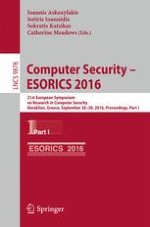2016 | OriginalPaper | Buchkapitel
On the Implications of Zipf’s Law in Passwords
verfasst von : Ding Wang, Ping Wang
Erschienen in: Computer Security – ESORICS 2016
Aktivieren Sie unsere intelligente Suche, um passende Fachinhalte oder Patente zu finden.
Wählen Sie Textabschnitte aus um mit Künstlicher Intelligenz passenden Patente zu finden. powered by
Markieren Sie Textabschnitte, um KI-gestützt weitere passende Inhalte zu finden. powered by
